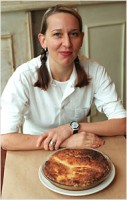I just read this post by the chef-owner of a restaurant called dirtcandy, about how girls can’t cook. She’s upset that women chefs get a relatively small number of James Beard Awards. Which, on its face, seems reasonable, because so few women actually work in restaurant kitchens. But she also points out that women chefs get very little press coverage compared to men–and of course it’s media buzz that drives the Beard Awards. So it’s not very encouraging for women coming up in the ranks.
This disparity is all due to one thing, I think:
Vegetables.
Let me explain. I started to think about this last year when I noticed that Naomi Pomeroy, who runs the restaurant Beast in Portland, says on her restaurant’s website:
Our food is simple, refined, and–dare we say–feminine.
What constitutes “feminine” food? I pictured some Bronte-esque spread on lace doilies. Meringues. Candied violets. But of course Pomeroy is a lot smarter than that.
 I thought back to when I (briefly) worked in restaurants. Gabrielle Hamilton’s Prune was, and still is, a singular restaurant. I wanted to cook, but I didn’t want all that “yes, chef” and who-gets-to-wear-black-pants bullshit to go with it. I didn’t want to put garnishes on things with tweezers. I wanted the challenge–the heat, the instinctive action–of the restaurant line, but I wanted to cook food I liked. Prune was the only restaurant in New York that seemed to offer that–and it still is.
I thought back to when I (briefly) worked in restaurants. Gabrielle Hamilton’s Prune was, and still is, a singular restaurant. I wanted to cook, but I didn’t want all that “yes, chef” and who-gets-to-wear-black-pants bullshit to go with it. I didn’t want to put garnishes on things with tweezers. I wanted the challenge–the heat, the instinctive action–of the restaurant line, but I wanted to cook food I liked. Prune was the only restaurant in New York that seemed to offer that–and it still is.
What’s the difference? Simply: Prune cooks whole meals, and that includes vegetables. There’s always a salad–a real, good salad, with hearty greens and an aggressive dressing, not a token “mixed greens” salad that the consultant told the chef he needs to put on the menu for the ladies. You have to order vegetables, because they don’t come with the main dishes. And if you don’t order greens, your server (if she’s Tamara) will advise you to, or else you might be in a world of hurt.
In your average (run-by-a-man) restaurant, you get some deep-fried appetizers, maybe a goat-cheese salad if they’re feeling a little livelier than the usual token mixed greens, and then you get your main dishes, which are all big slabs of protein with some sauce and a symbolic amount of Frenched green beans buried underneath. This is why I hate going out to eat.
The only restaurant I’ve gotten excited about recently is Momofuku and its iterations. Those are some meat-heavy restaurants, and a lot of the vegetables are deep-fried. But at least the menu is set up in a way that you can go heavy on the veg and light on the meat. I don’t need or want vegetarian–I just want a little freedom from the tyranny of the protein slab.
America’s food culture is totally screwed up–we all know this. As a nation, we hate vegetables. In fact, as Jamie Oliver recently showed, a lot of Americans don’t even know what vegetables look like. Popular, lowbrow, fast-food culture is largely responsible, but it doesn’t help that high-end restaurant culture reinforces the problem. Perhaps the new obsession in seasonal food will offer a new, non-gender-specific way of dealing with vegetables.
But for now, food that’s “good for you” tastes bad, and when you go out to eat, you “splurge.” This has a lot to do with restaurant machismo. A friend opined that all the big-knife, swearing, meat-obsessed chef culture comes from men overcompensating for the fact they’re doing what’s perceived as “women’s work.” I think she’s right. Restaurant kitchens and their products are for putting on a show, for doing something special–not for doing something as workaday as nourishing people.
Of course there are exceptions to the meat machismo, such as Thomas Keller, who has a vegetarian tasting menu at Per Se. And David Chang has raved about vegetarian restaurant Ubuntu (although his tone had a whiff of holy-crap-I-didn’t-know-you-could-eat-so-well-without-pig-parts about it).
 Then there’s the flip side: April Bloomfield is a well-known woman chef and gets praise all the time. And why’s that? Because she serves giant f-ing stuffed trotters. Just looking at the menu at the Breslin makes me tired, like I’ve been following some intractable political situation in the news, and now just don’t want to read another word about it. And if Naomi Pomeroy’s restaurant weren’t called Beast, and she didn’t have pics of herself carrying around a pig carcass, I doubt she’d get much play either.
Then there’s the flip side: April Bloomfield is a well-known woman chef and gets praise all the time. And why’s that? Because she serves giant f-ing stuffed trotters. Just looking at the menu at the Breslin makes me tired, like I’ve been following some intractable political situation in the news, and now just don’t want to read another word about it. And if Naomi Pomeroy’s restaurant weren’t called Beast, and she didn’t have pics of herself carrying around a pig carcass, I doubt she’d get much play either.
Aside from Bloomfield, women chefs aren’t popular, because they make you eat your vegetables, just like your mom.
For which I say again: thanks, Beverly.
(Yes, I call my mom by her first name. I don’t know why.)

you do too know why, she says testily: you didn’t have any kids your age to play with and the kids my age we played with called me beverly and you, being a little smart-ass kid, saw no reason to call me mommy when no one else we knew did… and you’re welcome, dear, she says sweetly…
I guess I knew the “smart-ass kid” part, but I never really thought about the rest…
Thom calls me Susan for more or less the same reason, except when he says-“Mothhhh-er,” or “You’re not old enough to see that movie, Mother.” Susan
Beverly, that’s the best comment ever! (he says sweetly)
I think the rule that applies to vegetables and women also applies to fruit and women. Fruit is not just something to be cooked with pork (though that is damn good), but can carry so much power in its own right. And, it isn’t just dessert either.
I was trying to work out an Eve and the apple joke to tag onto the end of my comment, but I just can’t make it happen. Alas, a wasted joke opportunity.